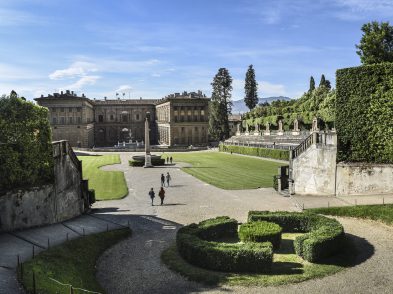To celebrate International Women’s Day, we gathered a panel of some our professional women friends in the Anglo community for a two-part series addressing a variety of issues facing our city. In the first installment we talked to our panel about issues specific to women, inviting them to compare their experiences as women here and in their home countries, making connections with other women-ex-pats and locals alike-and what they feel are the most pressing concerns for women in Florence today.
In this second part, our panel fields questions about local politics, tourism, and culture. Their answers are articulate and thought-provoking, providing insights into the various layers that make up the life of a woman who chooses to live abroad.
Our panel
Melinda Gallo, American, writer and web developer, in Florence for six years
Natasha Garland, American writer currently serving as marketing, PR and attaché services director for Palazzo Tornabuoni, seven years in Florence
Sarah Davies, UK, financial analyst, in Florence for nine years
Jo-Ann White, American, retail executive for Burberry, 20 years in Florence
Rachel Whittington, American, executive assistant, in Florence for 18 years
ON LOCAL POLITICS
It’s election time in Florence. The papers and local cafés are filled with speculation, critiques and comments about all of the candidates-left, right and center. For the first time in local history, the center-left primaries were opened to non-citizens, meaning that many in the Anglo community were able to cast their vote. Regardless of party preference, we asked our panel what the mayor’s top priorities might be, especially in regard to the Anglo community.
Jo-Ann suggests that the city administration take a good hard look at study abroad programs: ‘These programs educate students in many ways and, in turn, foster a strong bond between Italy and the countries from which the students come. Yet many students do not profit nearly as much as they should, often times sidetracked by excessive drinking. While not blaming the city for this behavior, I do think tightened laws and regulations would curb excessive alcohol consumption.’
Natasha hopes the new mayor will recognize what an extraordinary resource the Anglo community is and will tap it for ideas and participation in city affairs: ‘We have all come here because we love it. It is not that we need to change Florence, but I think we can certainly offer ideas that we bring from our respective lives that could benefit the city.’ Further, Natasha says, she would push the importance of the human scale of the city: ‘If you step off the Ponte Vecchio, Florence has an intimate neighborhood feeling that people living in worlds with malls, freeways, gated communities and three-car garages long for.’
Melinda would like to see the city made safer and cleaner for everyone, while Sarah hopes for a stronger voice for foreign communities: ‘Anglos are a large percentage of the population, but I’d like to see more active participation on the part of all foreigners, not just the English-speaking residents. The right for non-Italian residents to vote would be great, like in the recent primaries.’
ON TOURISM
We’ve all noticed it and, what’s more, we have the numbers to back it up: tourism is down in Florence. Is just the economic situation to blame or is it something more? Is Florence still an attractive destination in the world of globalized travel? Our panel has some tips for the local tourist industry on keeping tourism strong in Florence.
Rachel believes that Florence is no pricier than other EU destinations, especially where the shrinking dollar is concerned; however, with a few changes the city could become an even more attractive option: ‘If Florence could overhaul its public transport system, people could park outside the city and jump onto public transportation, affording them the convenient option of sleeping outside the city at a countryside B&B or agriturismo.’ Another idea: ‘Get more aggressive and improve PR and advertising in the rest of the world. Don’t wait for a New York Times travel journalist to do a write-up on something that’s been around for years!’
Several members of our panel agreed that ‘cleaning up’ the city is a key factor in promoting Florence as an attractive vacation spot. Jo-Ann promotes re-establishing pride in the city: ‘The shocking amounts of graffiti and dog waste are an insult to the heritage of this great city. If residents (both Italian and foreign) do not treasure this city, why should a tourist? These are small things, but ones that greatly impact the quality of life for everyone.’
Melinda agrees: ‘Florence is still very attractive because of the city’s magnificent art and fascinating history; however, we need to clean up the streets. There is too much vandalism on buildings, dog manure in the streets, poorly lit streets, illegal street vendors, and too few police officers patrolling the streets after dark.’
What about repeat tourism? Sarah wonders whether tourists are coming back for a second and third visit. She finds traffic fines one of the main deterrents to repeat visits: ‘The cameras that fine all rental cars €100 for coming into the city centre without insufficient warning of the consequences are not a good advert. Just try Googling “Florence, Italy, traffic fines” and the evidence is right there.’
Natasha finds questions of tourism difficult to resolve on account of its Catch-22 nature: ‘The cruise-ship tourism that sweeps through in the summer challenges the septic systems, grabs a miniature David and leaves does very little for the heart of the city. This kind of tourism ensures only two things: that the true craftsmen of Florence will not survive and that Florentines will make little effort to lower prices or provide good service. It infuriates me to see visitors taken advantage of, yet at the same time, it infuriates me when visitors plough through the city like it’s Disneyland.’ So what’s the answer? ‘The key for tourists is to rediscover its authenticity. It is truly one of the most magnificent cities in the world, but one that goes so far beyond the art and architecture. There is a way of life here that still lives-one that tourists crave-where people still take time to look each other in the eyes, and make a stack of oranges beautiful. Florentines should think of what they are most proud of and put that forward.’
ON CULTURE
One of Florence’s most pressing current concerns is whether it is possible to plan for and sustain culture in Florence given the massive cuts to cultural arts funding. Our panel responded overwhelmingly with two solutions in particular: private patrons and a little creativity.
As Rachel mentioned, the economic crisis will cause the arts to suffer even more, and unfortunately, Italy doesn’t have a way to give tax breaks to companies or individuals who make donations, meaning corporations and individuals simply don’t donate enough. She believes that, ‘If Italy wants to cut public funding for the arts, it would behoove policymakers to create incentives and breaks for potential patrons of the arts.’
Jo-Ann echoed that sentiment: ‘Artists are compelled to create, and with or without funding they will do so. With cuts, culture may not develop in the expected ways, nor to the same degree we are used to, but art is eternal. Planning will become more difficult, but perhaps individuals will pick up some of the slack and patronage will once again become the model.’
On a positive note Melinda feels that this is the moment to be creative with available resources: ‘Sometimes an absence in one area provides us with an abundance in another.’
Read Part I: Our panel fields questions about being a woman in Florence, making connections, women’s issues and more.








